#quotes relevant to meta
Text
Hello:3
posted on my personal blog about hannibal so much that i decided to create a separate one just so i can rant about it cuz i think im gonna get very deep into this gay cannibal shit for a very long time <3
my primary blog is @aggressiveguitarnoises so if u get a notification from that url, then yeah, that's me :) (personal blog, music especially nin based and other interests)
-------------------------------------------------------
rumai/canni/any variation of my url lol ¦ ukrainian ¦ 17 ¦ she/her
ofc expect hannibal on here (nbc for now but who knows!!!)
probably mostly reblogs than original posts? although i do make art but anyway expect:
hannibal quotes out of context (although most of it is on my other blog but...)
hannibal song of the day, music overall (got like 4 playlists just for hannibal,,,, concerning ik but here)
art!!! mostly digital and will be hannibal related (gonna be under rumaiq art hashtag)
hannigram. a lot of it. like cmon that's what the show is about. but other characters too obv
memes
shit posts
prob giving my opinions and thoughts in the hashtags, theyre very elaborate,,
rants about specific scenes or moments cuz i had a mind blowing realisation
asks open for anything(tho preferably hannibal related), including doodles
dms always open too:)
also got myself into a lovely mess of a hannibal rp and I am somehow running jack crawford's blog, @jack-loves-bella !
(there's also a discord server in the post which i highly encourage to join, it is very fun and very active, very friendly I love yall already)
i think thats it for now
enjoy:3

#introduction#ok gonna list any relevant hashtags here#nbc hannibal#hannibal#hannibal quotes out of context#incorrect quotes#hannibal song of the day#bitter sassy cannibal once said#will graham#hannibal lecter#hannigram#will graham core#hannibal lecter core#fanart#music#text post#shitpost#images#gifs#meta#hannibal cast#mads mikkelsen#hugh dancy#and obv other characters and actors#my post#rumaiq art#rumaiq answers#rumaiq rambles#i think thats it???#basically using these to categorise stuff on my blog enjoy
60 notes
·
View notes
Note
hello! i can't remember if you answered this in your wonderful astarion romance meta [THAT I CANNOT FIND AGAIN FOR SOME REASON...], but when he propositions us for a second time -- with the series of pick-up lines that we can cheekily call him out on -- do you think he's still in the 'i'm just trying to keep you on my side' stage, or is there maybe some interest in us beyond that?
Hello!! Ahh thank you, you might mean this one? I have another one where I broke down a separate scene so if it’s that one, I can dig for it! But!!!!
I’m currently phone-bound so I can’t grab my usual quotes screencaps BUT I DO have thoughts on that scene, so let me ramble—
for the scene you’re referencing in particular, I really do think there’s a degree of projection from the player (ie what you think this scene means for astarion and your tav is up to you) and personal interpretation for the pacing in here—so if someone else sees it differently or sees it paced differently for their tav, I can definitely get that. however, for me, this scene sort of represents this very interesting shift in the relationship, but not because astarion is developing interest, but because of how he’s acting around tav now that he knows he has tav’s interest secured.
in short: I do think this scene happens still mostly in “I’m manipulating you to keep myself safe,” territory BUT. What’s interesting is that astarion isn’t making any attempts to disguise that anymore. prior to this scene, his two potential propositions (both the one he initiates pre-goblin camp and the one that happens during the goblin party), while not necessarily “natural,” and most certainly not rooted in the first bloomings of a crush, or whatever, there’s a conscious effort to disguise his routine and, in essence, genuine seduction through appealing to Tav, trying to incite desire, etc. — he’s lying and when you know he’s lying it’s obvious, but there’s wiggle room for Tav to genuinely think, hey, this guy is interested in me. but the scene you’re referencing—“here’s my little treat with their cheeks all flushed…” “three little words. everyone’s favorite. I love you. (that would be a lie.) but a very sweet lie,” or whatever he says at the end there—descends very quickly into teasing (almost taunting) that is VERY heavy handed and very gleeful in how he almost …. dangles the falsehood of it in front of you.
there’s multiple ways you can interpret that. is he getting more egregious in his flirting because he feels like he doesn’t have to try as hard, but still TRIES? is he revealing the truth behind the facade because he’s starting, on some level, to feel comfortable enough to reveal THAT if nothing else? I’m less convinced by the second, more convinced by the first, but myyyy personal interpretation of that scene is one that kind of….. is within the romance but removed from it in terms of. I don’t think it’s about tav here, really. I think it’s about astarion.
to elaborate, I think that there’s a kind of thrill in this moment — astarion has been an object for sex and desire for 200 years, and he’s still doing that, still playing that role, but now he’s doing it without the overarching crushing influence of cazador behind him; his safety within the group is relatively secured now; there is less..... external (or perceived external) pressure to keep up the act, but he still does it. which I think results in him almost……. outright telling you that it’s false? like a kind of release, to say that the I love you is a lie, and you know that, and I know that, and I don’t have to FULLY pretend so, in his own way, he doesn't--he tugs and pulls at emotion, and kind of .... invites Tav into the lie, in a sense (thank god there's no option to say "I love you too," here, I worry that fans would take it and mean it sincerely. like. AUCK). maybe there's almost a vindictive thrill to getting to basically display his exaggeration. or maybe he's pushing at the boundaries of what tav & he have here, seeing how far he's sunk in. playing the role still, but at the end, you know it's at least partially an act. either way, poking and prodding like that, to me, isn't motivated by blooming squishy feelings. rather, it's something less sweet, less romance-y to boot, but more interesting for the character as a whole. or maybe that's just my own bias--I tend to find the Soft Squishy Romance to be the least interesting aspect OF the romantic dynamic. also, to be clear, I'm not trying to soften it up with elaboration here. taking away the context of astarion's history and past, what he's doing here is really just mean. it's a kind of cruel thing to so starkly display that you dont really give a fuck about the feelings of the person in front of you--enough to throw flirting and emotional barbs of "I love you," at them just for the laugh of it. it's a bitch move, but it's an interesting one, and I rarely see the conjunction of His Meanness discussed with how it manifests due to his history-- it makes complete sense and it's FASCINATING.
there is ONE thing I'll say, and that in the dialogue branch where you say, "Are you having fun?" or something along those lines, he says, "I am! It's hard not to, with you." and that, I do believe to be sincere, in its own way. I do think Astarion is having fun with Tav out on the road, being with them, being with the group, enjoying the show so to speak, and exploring his newfound freedom--all of which is wrapped up in proximity to Tav. there's arguments to be made that there's pacing issues here, but I actually interpreted the fact that we don't really have another romance-specific scene before the "you're wonderful"/drow confession to be intentional. to me, the trust bond with astarion isn't developed in moments where he's putting up the act or where you're expressing interest or attraction to him (he already knows, he's already removed from that, there's no trust to grow in these moments because sex/attraction is the last thing associated with trust to him), but rather, trust is reinforced over time on the road, through shows of support out and about during crucial, but NON-ROMANTIC moments (such as killing yurgir for him--a nonromantic act, but one that solidifies that he can trust you.)
all in all, after such longwindedness... I guess my answer is that. while I dont think he LOVES tav at all, and maybe he isn't even romantically there yet with them, I do think he likes Tav by this point, and enjoys their company and their presence. what that means to YOU is up to you! as I said, I think it's a scene where the pacing and emotional weight is partially up for interpretation. you can just as easily imagine that he's got unaddressed growing feelings there as you can not--especially since if you turn him down here, what he'll say is "I've gotten on my back more times than I can count [...] most of them I don't even remember. but you, I'll remember." <- possibly implying that there was the start of a potential something here, ultimately ended, which he isn't really sad about because it removes the overall pressure of putting up a show, but at the same time implies a fondness for tav the person; again, not necessarily romantically oriented, but positive emotion regardless.
#bg3 meta#sorry I dont have screencap quotes on hand for this! I just got home from work#BUT YEAH. this is one of my favorite scenes because of what you can kind of infer from /astarion's character/ for this#it is. probably my least favorite scene in terms of viewing it in any sort of Actual romantic lens#I know there was a lot of gushing over the My Little Treat line but even when I played it without knowing the ending or where#the romance was going. I was like. oh lawd. you are EGREGIOUSLY LYING.#in reality the romance route to me is sooooooo fascinating but I rarely get Big Mushy Feelings about it...... not till late act 3 anyways#everything prior to that I sort of detach from a romance lens at all and it's Just for the buildup to something real. ANYWAYS.#sorry that's not at all relevant to your question! um.#guy who is so normal about character you have to peel like an onion to analyze their 15 different lies and masks on#thank you for the opportunity to RAMBLE INCESSANTLY once again#answered
84 notes
·
View notes
Text
a key aspect of wwx as an inventor is his resourcefulness. he rarely invents wholly new things, he repurposes things that already exist.
the primary example is obviously ghostly cultivation, in which he repurposes the resentful energy of ghosts for his own means. wwx notes this himself, saying 'why waste it when it can be useful'.
and there is the yin hufu. the sword had been in the xuanwu for years, absorbing centuries of resentful energy from those who'd died, it even harmed wwx at the time. but he still thought 'this can be made into something useful' months later, he even remembered it and went back for it.
his evil-attraction talismans were made directly from evil-repelling talismans. he wasn't just inspired by them, he literally added a few strokes in his own blood to the evil-repelling talismans the wens had set up, reversing their function.
this is a constant of wwx's characterisation, he remembers the protective embroidery in the lan's robes and uses it to shield sizhui at mo manor, he needed a flute and so carved one directly from a nearby bamboo tree, in yi city he immediately knows to find a building with a living(ish) resident so he can have access to a stocked kitchen to make healing congee, and he repurposes the funeral paper effigies to fight for him. in any scenario, he instinctively notes and uses the resources around him, often repurposing them in a unique way.
this is fundamental to wwx—he innately thinks outside the box, is never confined by norms and expectations and is unafraid to directly challenge them. these traits are the source of his genius as well as his defiance of his society.
#mdzs meta#it could be said that his resourcefulness comes from his experiences of starvation and homelessness as a child#and relevant to that is his use of a dizi (associated with lower class) and congee as a cure (a folk tradition)#mdzs#i think this could also be seen in his rhetoric he uses against the wens in xuanwu cave and later the jins & other confrontations#he takes peoples own words or doctrines and uses them against them to highlight their hypocrisy#idk mxtx is just so good at show don't tell and her characterisation is just so clear and consistent#i paraphrased the quotes in this don't @ me
139 notes
·
View notes
Note
i need to know everything about your pjo voltron au
okay so basic plot premise: Thalia, Luke, Jason, Percy, Maria di Angelo, and Bianca all work at the Garrison and get sent on 3 separate missions (Thalia & Luke, Jason & ??? or maybe he's just by himself, then Percy & Maria & Bianca) which are all "lost" and they're declared dead by the Garrison.
Of course they were actually all abducted by aliens. Maria probably dies pretty early on in that whole situation. Thalia gets separated from Luke and ends up escaping and becoming a rebel. Luke, Jason, and Percy & Bianca all separately (except for Percy & Bianca) end up gladiators. Luke becomes The Champion and basically ends up a Kuron/Sendak-type character situation. Is he being mind-controlled? Unclear. He has a giant alien scythe-sword though. Bianca probably dies buying Percy time in the arena. At some point Percy and Jason find each other and decide to try and stick together.
Hazel is a human raised by her galra dad in space with the Blade of Marmora. She knows she has a half-brother through her dad out there somewhere but not anything else about him. She ends up running into Jason and Percy on a mission and helps them escape cause they're humans too.
Back on Earth, Piper, Leo, and Annabeth are all Garrison students. Or Annabeth is possibly in a Keith-type situation where she used to be a student but got Kinda Pissed Off about all her loved ones disappearing into space and ended up getting kicked out. Nico is in a Pidge-type situation where he snuck in as a student under a false name to figure out what happened to his family's mission. Percy and Jason crash on earth, the gang finds them, they find the Blue Lion, and Percy pilots it to the Altean castleship where they meet Reyna and Frank. Reyna is the Altean Princess, because her sister Hylla was queen. Frank is the son of a high-ranking general or something and he and Reyna are a duo.
Rest going under a cut cause this got long -
Lion adventures happen - Annabeth pilots the Green Lion, Jason pilots the Black Lion. Nico finds the Red Lion and meets Hazel when he does and brings her back to the castle. Hazel pilots the Yellow Lion. Nico very quickly realizes he's half-Galra and Hazel's brother and joins the Blade of Marmora. Percy swaps from Blue to the Red Lion. Piper starts piloting the Blue Lion. Leo, Frank, Reyna, and Nico end up the home-base support team. Percy probably keeps the blue paladin armor and Piper gets the spare pink armor for color association reasons and also cause that's usually the format for every iteration of Voltron anyways. It works out nicely. Everybody has extra lion compatibilities too/every Lion has a back-up basically cause I'm still mad vld canon dropped the lion lore/sentience plotlines and we never got cool dynamic lion swapping instead of just the usual single switch. We're having fun here.
Then everything else I don't have much for other than Annabeth and Nico basically swap Keith and Pidge roles once they join Voltron so Nico goes and has his galra identity crisis adventures and Annabeth reunites with Thalia at some point, who is basically in a Matt-type role. And Luke functions as the Sendak-level antagonist who Annabeth probably gets to fight with a swap back to Keith's role in a whole Keith & Kuron emotional situation. Kronos and Gaea are probably analogous to Zarkon and Haggar/Honerva here but not necessarily in that order, and obviously it's more of an either "Emperor and his advisor mom" or "Empress and her prince son" but in either one somebody's doing magic and people are probably getting possessed. Hades, Persephone, Iaepatus/Bob, and Damasen are all with the BoM. The Titans/Giants are probably all Empire generals. Who's Lotor? Octavian? Calypso? I don't know. Who are all the gods? I dunno. We'll workshop it.
#pjo#riordanverse#ask#dreamyzworldlove#vld pjo au#long post //#i think a normal about about the BoM and galra lore okay#i am a simple being. i like worldbuilding. show me funky fluffy purple aliens and i will be invested#i made a whole translation of their alphabet so i could write with it#as for the rest -#Annabeth & Luke with the "You're like a brother to me - I love you'' probably constitutes as psychological violence on a meta level#it maps hilariously well though in terms of both narrative function in the au canon#AND meta level comparisons of fandom reactions re: Luke's death / the Kuron fight and relevant quotes in both. the bloodshed...#anyways its too perfect though and im amused by the parallels of meta baggage there so it stays#i am also now rapidly rotating all lotor options in my brain#also Nico joing the BoM is essentially analogous to him running away in TTC#except he's not 10 here so he probably does it with a bit more grace#he probably finds out about his mom and sister. gets real sad. then meets Hazel#and finds out she's his sister and their dad is around and he goes ''...okay. im okay now.''
29 notes
·
View notes
Note
So one scene that always confuses me is the geraniums scene in crooked kingdom. ppl love this scene and think it’s so romantic but did kaz do that on purpose? i always read it as he just happened to dump a flower bucket or whatever it was that had geraniums in it and it was sorta a coincidence. but then like i never understood why he dumped that flower thing into the canal in the first place either. so idk can you explain how you interpreted it?
To answer succinctly: No, Kaz didn't drop them onto a flower boat specifically populated with geraniums on purpose. Until Inej tells him, he has no idea that they're her mother's favorite flower. His plan was "drop off the bridge onto a barge. Wait for the Mister Crimson ruckus to begin. Pop back up wearing disguises and escape."
Kaz dumps the flowers into the canal because he's trying to get to the Mr. Crimson costumes and "wants the crowd in a very good mood." In his mind, I think it adds to the chaos, flair, and 'prettiness' of the scene. It also provides a distraction and some additional cover for him to put their disguises on. The fact that those flowers happen to be geraniums is pure coincidence:
He heaved a flat of wild geraniums into the canal over the protests of the flower seller and grabbed the clothes Matthias had stashed there earlier that morning. He swept the red cloak around Inej’s shoulders in a rain of petals and blossoms as she continued to strap on her knives. She looked almost as startled as the flower seller.
“What?” he asked as he tossed her a Mister Crimson mask that matched his own."
"Those were my mother’s favorite flower.”
“Good to know Van Eck didn’t cure you of sentiment.”
“Nice to be back, Kaz.”
“Good to have you back, Wraith.”
-Ch. 9, Crooked Kingdom
A lot of people see this as a romantic scene because of the imagery: Kaz and Inej are "alone" on a boat with flower petals raining down on them as they basically confirm that the other is alive, okay, and ready to escape. It's also somewhat romantic because it's a callback to the "many boys will bring you flowers" quote Inej ponders in SoC.
To go into a bit more detail about this scene though, I think it's easy to interpret the geraniums as being the thing that's important, but it's important to remember that a) geraniums are her mother's favorite flower, not her favorite flower, and b) the quote about boys and flowers isn't about the flowers. It's about finding the person who will take the time to get to know you well enough to know what your favorite flower is:
Many boys will bring you flowers. But some day you’ll meet a boy who will learn your favourite flower, your favourite song, your favourite sweet. And even if he is too poor to give you any of them, it won’t matter because he will have taken the time to know you as no one else does. Only that boy earns your heart. -Ch. 10, Six of Crows
So why the geranium callout? Because I think Inej is subconsciously thinking about what her "geraniums" are and gets startled when literal geraniums start smacking her in the face.
The scene is from Kaz's POV, but think about it from Inej's: she's spent a week being held hostage, 24 hours of which she spent terrified she was about to be tortured. She then witnesses Kaz outsmart Van Eck again and leave a very simple note: Noon tomorrow. Goedmedbridge. With her knives. They show up to the bridge where Kaz confirms she has her knives, and then they promptly work effortlessly in tandem to escape the stadwatch and bail over the side of the bridge with nothing but a look and a single comment: "West side flower boat."
Inej is clearly thinking about a lot of stuff in this moment, but there's at least 3 things running through her mind: one, Kaz came for her. Two, he explicitly made sure that Van Eck gave her back her knives. Three, they just executed an escape plan flawlessly with basically no communication while showcasing incredible mutual trust.
The boat moment, of course, comes on the heels of Inej having a crisis of faith that Kaz only cares about her because of her usefulness, which culminates in her "he won't trade if you break me" confession. Is she thinking about her knives as an extension of her usefulness in that moment? Probably. But she also might be thinking about how Kaz knew her well enough to know how much she loved her knives and wanted them back. And then geraniums smack her in the face.
Because why is the geraniums moment here, of all places? Why does Inej tell Kaz her mother's favorite flower now, after two years of living and working side-by-side with him? Why is this comment important enough for Bardugo to write but seemingly not important enough to write from Inej's point of view, especially when she spends Inej's next POV chapter repeatedly driving home her fear over whether Kaz would discard her if she was useless?
Because in that moment, Inej isn't thinking about her usefulness. She's not thinking about revenge on Van Eck or her own safety or whether her friends are okay. She's thinking about Kaz, and I think her thoughts are too wistful and fanciful to make sense in any context other than their chaotic escape sequence. The second they're out of danger she's back to ruminating about her usefulness in a way that makes the geraniums comment seem like a complete non-sequitur...unless you think about Inej's knives:
Kaz had taught her to crack a safe, pick a pocket, wield a knife. He’d gifted her with her first blade, the one she called Sankt Petyr – not as pretty as wild geraniums, but more practical, she supposed. -Ch. 16, Six of Crows
He’ll never trade if you break me. She was grateful for the weight of her knives. She touched her hands to them as if greeting old friends, felt some of the tension inside her ease. -Ch. 11, Crooked Kingdom
So what do I think Inej is thinking of in that moment? I think Inej is subconsciously thinking about what her geraniums are in the context of her relationship with Kaz. And we aren't privy to that moment because Inej's geraniums are her knives and it's too early in their story for the explicit confirmation that Kaz knows Inej well enough to know that given Inej's doubts and Kaz's chronic inability to showcase emotional vulnerability; that only gets resolved with Kaz promising her "knives drawn, pistols blazing," the Bathroom Scene, and Kaz showing up at the harbor after the Auction to gift her the Wraith with ungloved hands.
Anyway, Inej's geraniums are her knives and Kaz made sure she had both his knife and her own knives during the escape sequence. Connect the dots there and the geraniums moment makes a lot more sense.
#thanks for coming to my ted talk#I could do a whole meta all on its own about how Inej's knives are her geraniums lmao. there's a LOT of relevant quotes#my personal headcanon is that Inej's favorite flower is something super pretty but also incredibly practical btw#like sweet peas or chamomile or lavender. maybe even pansies#inej ghafa#kaz brekker#kanej#six of crows#crooked kingdom#soc meta#long post#asks#queue#otp: on the seas and in the city
256 notes
·
View notes
Text
So I realized today that I use an association between gifs and quotes that I’ve never explained cuz I assumed everyone would understand, which I’m now realizing might not be the case, especially with the new natla fans. So here’s a quick rundown:
The Avatar and the Firelord = the development and/or historical decline of homoerotic friendships
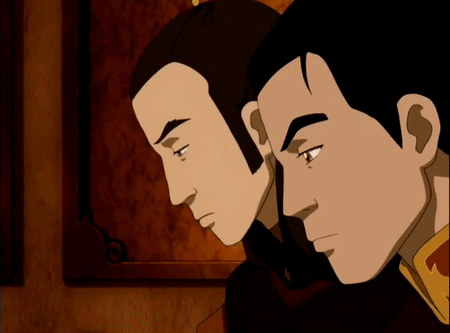
Sun Warriors temple from The Firebending Masters = disrupting the assumption that the past and/or ‘traditional cultures’ are inherently more conservative and that history and civilization inherently moves towards progress and justice

Firebending Masters zukaang in the flames = understanding balance within self and coming to terms with one’s shame and/or healthy masculinity

Crossroads of Destiny = savior and victim complexes and/or ego death

Aang and Zuko look in The Storm = homoerotic rivalry
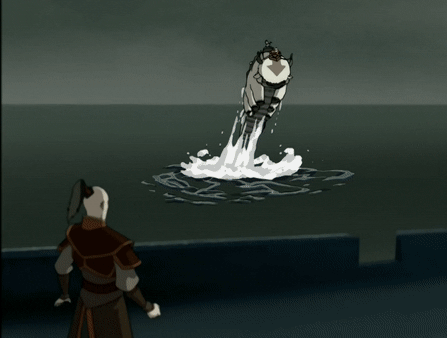
Aang Flower Crown = Gender non-conformity especially in indigenous and/or cross-cultural contexts

Aang air chakra from The Guru = genocidal and colonial loss and/or the continuing presence of ancestral love
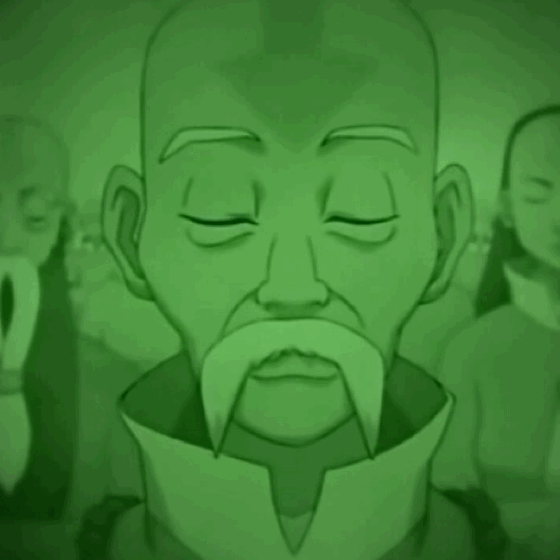
Aang happy tears = finding hope within grief
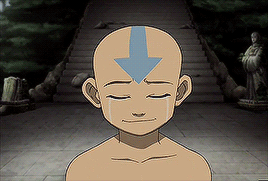
#likealittleguide#lol#literally just showing off my theory of mind dysfunction 💁🏻♀️#i thought everyone knew the avatar and the firelord is the best analysis of homoerotic friendships in 19th and early 20th century fiction#until today#when I realized that it’s possible no one knows what I’m talking about at all lololol#Atla meta#kind of#in that it will help you make the connections to the quotes and see the relevant analysis
11 notes
·
View notes
Text
He told her he forgave her, which only increased her sense of guilt, for surely there had to be something to forgive.
Doctor Fischer of Geneva or The Bomb Party by Graham Greene
#something something of relevance for good omens here#graham greene#Doctor Fischer of Geneva or The Bomb Party#good omens meta#good omens#quote
3 notes
·
View notes
Text
i have SO many thoughts about the river
#meta post pending hmmmmm#the locked tomb#i’m less than a hundred pages into nona so going to finish nona before i post incase if relevant quotes#but oh my god the invitation of the symbolic river for the afterlife-purgatory-necrosource
4 notes
·
View notes
Text
I want to talk about how Dungeons and Dragons Honor Among Thieves is an excellent use of meta humor applied seamlessly to a story without ever breaking immersion.
Mild spoilers. I'll keep it vague so nothing will be spoiled if you choose to read on
This movie integrates many things that someone familiar with D&D would recognize from the narrative structure of a campaign.
There are some things in particular that demonstrate this particularly well
At one point, the party is joined temporarily by the character Xenk. But he really feels like he'd be an NPC party member controlled by the GM rather than a player. So when the other characters banter and quip, this character doesn't really join in or get their jokes cuz he simply wouldn't have the agency to. More examples of this would be how he's much more capable than the others, but he doesn't overshadow them. He provides aid if it's desperately needed, and will sometimes bail rhe party out of situations they can't manage on their own, just like how a GM should utilize an NPC companion. He even has a quote that perfectly reflects this. "I've given you the tools. Now you have to be the ones to use them". There's even a more direct joke about his NPC behavior. When he leaves the story, he walks off in a random direction, going straight forward, even stepping over obstacles and terrain unnecessarily. This all amounts to him feeling like a very clear GM controlled NPC, however he is presented in a way that still makes him feel entirely faithfull to his own world and does not break immersion
Other ways the movie plays around with the GM campaign structure would be the approach to backstory. The only time a character outright explains what their backstory is, in full, directly to us, is at the very start, to give context for the story going forward, as the character even puts it himself. Backstory later in the movie is told to us whenever it's relevant. Characters will toss in another fact or two about themselves in situations where mentioning a past experience would fit in. Much like how players usually prefer to build their characters.
And one of my favorite instances of being meta about D&D campaign structures comes in the second act.
the characters are faced with a complex and dangerous obstacle. The GM's stand in, xenk, explains the method of progressing through this obstacle correctly. But in true D&D fashion, the party immediately does it wrong and now the campaign has been derailed and the GM's setup squandered. So now they straight up don't have a way forward in the narrative. Logically, it should end there. But that'd be a shit campaign, so the GM would naturally bend the rules to get things back on track. So after the party fails the obstacle, one of them goes; "Hang on, that stick we've had with us the entire time isn't a stick after all! It's actually a magic staff that solves our EXACT predicament at this EXACT time". That is such a clear cut meta joke about GM's having to get things back on track cuz players are all chaotic evil. Is it a plot contrivance? Absolutely. One of the biggest ever. But it's what D&D is built on
2K notes
·
View notes
Text
This is a meta on Our Flag Means Death episode 5: The Best Revenge Is Dressing Well, Sir Godfrey Thornrose, The scene where he calls Ed a donkey, and so called "race science."
It has come to my attention that some of you apparently do not know what a phrenologist is.
*a note: I'm going to for the purposes of this assume that the guy played by Jeff Lorch is sir Godfrey Thornrose, I do not know this for certain but in my opinion even if he is not Thornrose the same principles still apply to him for reasons I will discuss in this meta.
So lets recap the scenes I want to touch on. At the beginning of episode 5 Stede is teaching Ed how to identify rich people cutlery like they're Barney Thompson and Vivian Ward in pretty woman. Stede bitches at Thornrose for not having enough spoons for Stede's liking. Thornrose responds "My apologies, I hadn't imagined we'd be hosting your kind."
Ed responds "My kind, what kind"
to which Godfrey responds "A rich donkey is still a donkey."
Ed then proceeds to scream at him and then orders Fang to skin him with a snail fork before throwing him overboard. To which Fang presumably responds by either skinning him with a normal skinning implement or forgoing the skinning step and just throwing him overboard, because who tf has time to skin a man with a snail fork.
I've seen some dogshit takes on this scene. I've seen it treated as evidence that Ed is exceptionally violent or abusive or has mood swings or anger issues or whatever bullshit. And I... Do Not Agree. You'll see why.
The next scene I want us to have in our back pocket is the first couple scenes with Gabriel and Antionette. When Gabriel and Antionette introduce themselves to Ed and Stede they reveal that Sir Godfrey Thornrose is a quote "Master Phrenologist." Stede is then expected to study Antionette's head. When he does he introduces his fake craft as "Phrenology, which is the study of the human head." He then takes a wild guess as to Antionette's heritage based on her skull lumps.
Content warning for like real old school racism ahead.
The reason Stede goes for the heritage is because Phrenology is a pseudoscience closely linked to other contemporary race science of the time. It was the idea that bumps on your head, thought to be caused by the pressure of the brain, could be used to identify your personality traits.
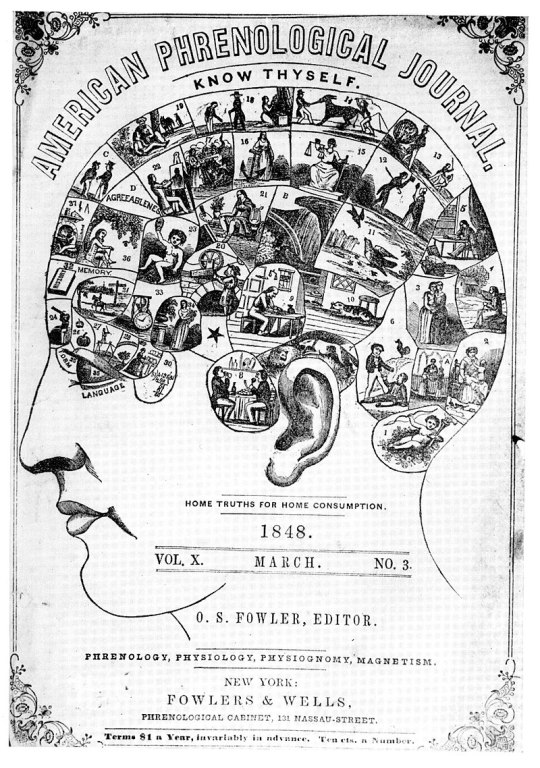
Phrenology gets really fucking racist, really fucking fast. Phrenology was used as proof that the white race was superior to other races, and as a justification for slavery and eugenics. Eugenics is the idea that you can improve society through breeding out "bad genes", which is almost universally popular among all types of racists, but the Nazis were big fans of it and there's a direct through line between the race scientists in the 1700s who were into phrenology and modern hate groups and neo nazis. I wanted to use an image here as an example of racist phrenology texts, but it's rough and I don't want to make a cut so I'm just going to link to the wordpress anthropology article I found the picture in, it's sourced and an alright place to start if you're into further reading.
With this information, I would like to use another example, that is relevant to the ethnicities in contention. A French physician who attracted huge crowds with his phrenology lectures, François-Joseph-Victor Broussais, once claimed that Maori people (as well as indigenous Australians) could never become civilized since he claimed they had no cerebral organ for producing great artists.
This is the context in which we need to understand the exchange between Ed and the French captain. I've seen some people claim it's about class and not about race, but Thornrose acknowledges Ed's wealth when he says a rich donkey is still a donkey. It doesn't matter to a man like Thornrose what Ed does or how rich he is or how well he can learn his fucking forks, he's still akin to an animal in this skull molesting freak's racist little mind. If a phrenologist, or even someone who's rubbing elbows with a phrenologist, calls a man of color a donkey they're clearly saying he's an uncivilized animal based on the shape of his face. That's how racists operate.
And Sir Godfrey Thornrose is not just any old racist, he's a racist spreading his ideology to other people, convincing them that people like Ed are inferior, that people like him should be subjugated by white people. He is clocking in for his shift at the racism factory creating more racists.
So basically what I'm saying is Ed should skin him, no quarter for genocidal maniacs. Basically I can tell you're either racist sympathetic or talking out of your ass if you think French captain was fucked up. It was antifascist direct action and I don't want to hear another word about it. I personally believe the only thing you can't come back from is death in terms of being a better person. I also believe that there are situations in which killing someone is more or less fine and you're never gonna catch me feeling bad for a fucking phrenologist when he compares an indigenous pirate to an animal and the pirate responds by doing what pirates do.
Killing Godfrey was based.
#ofmd#our flag means death#edward teach#blackbeard#edward teach ofmd#blackbeard ofmd#sir godfrey thornrose#cw racism#cw scientific racism#cw phrenology#Episode 5: the best revenge is dressing well#ofmd meta#ed teach#Ed “babygirl” Teach punches nazis
227 notes
·
View notes
Note
TLT meta post suggestion: explain the biblical significance of Paul to someone who knows jackshit about Christianity?
Paul is what happens when a clever person with establishment clout has a searing moment of metaphysical transformation that allows them to become a real nuisance...
The very TL;DNR version of Paul in Christianity (Bible!Paul, if you will) is that he was once an observant Jew called Saul who was involved in persecuting the early church. But one day, while enthusiastically doing this, he is struck blind by a huge flash of light and hears the voice of Jesus. From that point on he is known as "Paul", becomes an enthusiastic follower of Jesus, and helps to spread the gospel. Specifically, he is referred to as the 'apostle to the gentiles', taking the teachings of Jesus beyond its early Jewish roots to the wider Mediterranean world.
On a basic level, Necro!Paul being 'Paul' is probably a reference to that blazing moment of transformation - Bible!Paul is both continuity and change: the same passion, but expressed very differently. Well-educated, willing to cause trouble, and energised by something beyond the human norm.
But it's their speech to Ianthe where the Biblical stuff really starts to come through. It's worth noting that letters written by Bible!Paul (or 'written by him') account for nearly half of the books of the Christian New Testament and are hugely foundational in Christian theology.
And Necro!Paul's speech to Ianthe is full of Biblical references:
"I know how hard it is for you to kick against the goad," said the new person. "But there are more worlds than this. Come with us. We are the love that is perfected by death - but even death will be no more; death can also die."
That first line, 'kick against the goad', is a direct reference to Paul's 'Road to Damascus' moment where he hears Jesus:
I saw in the way a light from heaven above the brightness of the sun, shining round about me, and them that were in company with me.
And when we were all fallen down on the ground, I heard a voice speaking to me in the Hebrew tongue: Saul, Saul, why persecutest thou me? It is hard for thee to kick against the goad.
And I said: Who art thou, Lord? And the Lord answered: I am Jesus whom thou persecutest. - Acts 26:13-15
To kick against the goad (or, in the slightly more colourful language of the KJV 'kick against the pricks') is to engage in an excercise in futility. It's a reference to an ox goad, a sharp instrument used to steer oxen in farming, which would hurt the animal if it tried to kick against it instead of following where it was being directed.
It's an acknowledgement that Ianthe is doing something that rubs profoundly up against the metaphysical grain, that her own proud self-direction will only hurt her in the end.
'More worlds than this' is a reference to Hamlet, which Dulcie of course also quotes in TUG. (Hamlet rather seems to haunt the question of the River Beyond, but that's not what we're discussing right now...)
'We are the love that is perfected by death' is, I suspect, meant to reference two different Bible verses. The first is:
Put me as a seal upon thy heart, as a seal upon thy arm, for love is strong as death, jealousy as hard as hell, the lamps thereof are fire and flames. - Song of Solomon 8:6
Despite centuries of the church trying to claim that it's about the spiritual relationship between God and man, the Song of Solomon is now generally accepted to be a sexy poem about sex. So that's an interesting thing for the fusion of Palamedes and Camilla to quote... But perhaps more salient here is what's contrasted to the strength of love and death, which is jealousy and hell. Ianthe is being offered a chance at redemption - which is of course Bible!Paul's whole thing - which she summarily rejects. I'm sure, given NTN ending with Harrow going off to, one assumes, er, harrow hell, that this won't be relevant at all...
The other verse that 'love that is perfected by death' may be referencing is:
In this is the charity of God perfected with us, that we may have confidence in the day of judgment: because as he is, we also are in this world.
Fear is not in charity: but perfect charity casteth out fear, because fear hath pain. And he that feareth, is not perfected in charity.
Let us therefore love God, because God first hath loved us.
If any man say, I love God, and hateth his brother; he is a liar. For he that loveth not his brother, whom he seeth, how can he love God, whom he seeth not?
And this commandment we have from God, that he, who loveth God, love also his brother. - 1 John 4:17-21
The quotation in the Douay-Rhiems translation (apparently the preferred translation of lesbian necromancers in space, if Gideon the Ninth is anything to go by) is a little opaque, but 'charity' is an old timey way of translating 'love'. Essentially, this passage says that those who love God and are loved by God do not need to fear the day of judgement, and clarifies a bit about what it means to love God.
There are two things that are important.
The first is that this is from 1 John. There are five Biblical texts associated with St John: the Gospel of John, the Book of Revelation, and three Epistles (letters). Revelation is John's vision of the end of the world - and if you're wondering whether it's relevant that The Locked Tomb features a guy called John who ends the world, yes, it is - but the Epistles were written right at the end of his life. And 1 John has two themes that might be relevant to The Locked Tomb: the first is the question of what it means to love god (spoiler: the answer is not 'dinner and a movie'), and the second is whether your actions matter.
The second thing that might be relevant here is that just before this in 1 John 4, there is a warning about not heeding false prophets. Specifically, it warns about the antichrist. You know, the thing Necro!John says he was repeatedly accused of being? The point is that love - love properly understood - can protect you from the wiles of the antichrist. Probably not a relevant theme as we head off into the 'you have not yet begun to witness the horrors of love' book where people are presumably facing down a pretender god...
The final part of Paul's speech to Ianthe - 'death will be no more' - is also Johannine: this time from Revelation:
And God shall wipe away all tears from their eyes: and death shall be no more, nor mourning, nor crying, nor sorrow shall be any more, for the former things are passed away. - Revelation 21:4
This comes from a section where the Biblical John watches as the old world is destroyed and the new Jerusalem descends from Heaven. Death and sorrow are ended, and the righteous will rule with God. The sinful have a less fun time of it, involving fire and brimstone and 'the second death'. If that sounds familiar, it's because Necro!John cribbed that particular bit when making up his shoddy Space Catholicism (TM). (The implications of this really deserves a much longer treatment, so watch this space...)
One of the nice things about Tamsyn Muir's Biblical parallels is they're not generally exact. But it's perhaps relevant to note that amongst Bible!Paul's rather dramatic adventures are quite a few instances of casting demons out of people, starting at least one riot, shipwreck, and an "Incident at Antioch". Also...it's probably not relevant that the writings of St Paul were the turning point in the conversion of St Augustine...specifically a section about how the end of the world is nigh so you'd better get your act together...
All in all, Paul is...a very niche joke about Plato, hopefully not a joke about Dune, and mostly very, very apocalyptic. A new beginning at the end of the world! An offer of redemption to those swimming against the current! A warning to false gods! A sign that the end is nigh! All of which suggests Alecto the Ninth is going to be a wild ride (as if we didn't know that already).
91 notes
·
View notes
Text
Once and Future Royalty
Just, stay with me on this one. I know its going to look crazy at the start, but trust me, I know where I'm going.
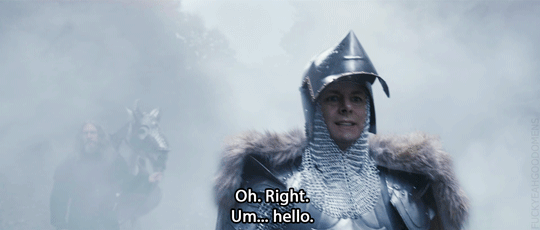
It all started with the 537AD scene in Wessex in the opening montage of "Hard Times," S1E3. Yeah, the one where Aziraphale is supposed to be a knight of the Round Table and Crowley is role-playing the Black Knight, and they are both so super-squeaky shiny clean - not a speck of dirt or mud on them. wtf! It looks out of place, unrealistic, and was bugging the crap out of me, like a stone in your shoe. It just didn't fit. I mean, why put a myth, a legend, into that sequence? Oh, OK, yeah, the preceding stories from the Bible, like the Garden of Eden and the Flood, aren't "myths" as well, you say? Hmm. In the context of the Good Omens AU, being a biblical based story, they belong there far more than the legend of King Arthur.
King Arthur, who supposedly united Britain under his rule during the late 5th century and early 6th century, was shown to have the divine right to rule by wielding the mighty sword Excalibur. Some stories tell of Arthur pulling Excalibur from a stone. Some tell of him receiving Excalibur from the Lady of the Lake. Either way, it was bestowed upon him by divine grace. Despite his triumph in battle, he left no heirs, as his queen, the fair Guinevere, was barren. She had a long-running love affair with the greatest knight of the court, Sir Lancelot, but despite this being an open secret in court Arthur would not put her aside. The knights of the Round Table in the court of Camelot were near-paragons of Christian virtue, and there are many tales of their search for the Holy Grail, the cup from the Last Supper of Jesus Christ.
In the end, mortally wounded in battle, Arthur was taken away for healing, and never seen again. It was said he would return when Britain was at it most direst hour to save the day once more. A "messianic" return.
The Once and Future King.
Now, I'm no Arthurian novice; I drank up all of T. H. White as a teenager, read the Dark is Rising multiple times, Marion Zimmer Bradley's interpretation and what ever else I could lay my hands on for a good couple of decades. And there is LOTS of King Arthur stuff around. You are not left wanting for anything new to read or consume. And I'll bet there are a fair few of you also out there who know a quite bit about the legend as well. Oh, and I can't tell you how many times I have watched Monty Python and the Holy Grail. I still walk around quoting it day-to-day, like the good little Gen-Xer I am, having grown up on that stuff. So I really should have listened to my intuition when bits of Monty Python kept popping up in my brain in response to other parts of GO I was thinking about. (Staaay, I said, stay with me here....)

I kept chewing away furiously on the Wessex problem, growling in feral frustration at it, but also kept reading and sorting out some other ideas and metas at the same time. Eventually I found the key in a tiny little post, about a small detail in the 1941 Blitz episode S2E4, of all places. I wanted to slap myself with how much was staring me in the face so obviously once the door opened. And the damn beauty of it is, that I already written about some it, out of context, without knowing the why.
OK. Where to start this journey...hmmm, back to Monty Python, because, guess what - the Wessex scene is actually riffing off one the more famous skits out the the Holy Grail. The scene is a masterpiece of political satire, from start to finish, but the relevant part here is this sequence:

In case you missed the salient points: Arthur claims he is king by divine providence, because he was given Excalibur by the Lady of the Lake. Dennis the peasant protests this waterlogged method of determination, mentioning ponds, watery tarts and a moistened... well, I hope you get the idea about where this is going.
Meanwhile, in 537AD, Wessex, as the mist swirls around them:
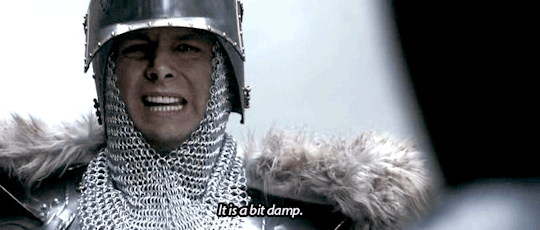
"It is a bit damp," complains a shiny silver Aziraphale.
Yes, Excalibur would be a bit damp after it emerged from the Lake. (vidavalor! Get your mind out of the gutter! I'm trying to have a serious discussion here! Please! And I wasn't even going to go anywhere near what the sword in the stone is really meant to be referring to...it's not even relevant to the discussion at hand, I swear! Well, there is going to be sexual relations mentioned but - oh, never mind...)
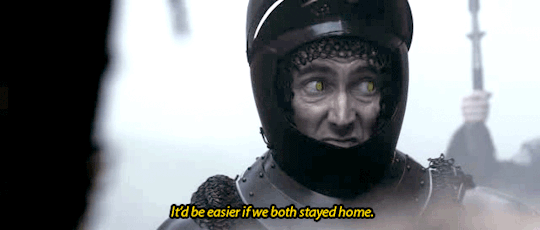
Right. Where were we. Lets leave those super-clean elite pretendy knights to swim off through the swirling mist back to their dry homes to write and file reports to head office, along with Patsy and the hired Igors, and Dennis can keep playing in his lovely muddy filth after he finishes protesting being repressed by the divinely-deluded Arthur. I've got a bit more to say about what Aziraphale and Crowley might represent here later but you need some more context first, so lets move on. I just needed to show you the first bit so you can see the Arthurian theme stretches across both S1 and S2, and will likely appear in S3 as well. More about that towards the end.
Ah, before I forget...another ref from the Holy Grail we need to cover:

This GIF, unfortunately, doesn't have the full exchange between the peasants, which is this:
P1: "Who's that then?"
P2: "I don't know. Must be a king."
P1: "How can you tell?"
P2: "Because he doesn't have any shit on him."
Ah. Er. OH!
Have you made the connection?
Who have I been emphasizing as being unusually clean in their Arthurian setting? That's right, Aziraphale and Crowley.
What's this implying? That they are royalty. Celestial royalty. Maybe not kings, but how about princes? You know how we've been discussing whether Crowley was a once at least an Archangel, and there is even a hint that he was a fallen prince of Heaven given during the replay of Gabriel's trial? (Not the prince, but a prince - a seraphim) And that Aziraphale may have once been Raphael, and may be again in the future? Once and future royalty. To me it adds weight to the past discussion, and helps to explain the assumed authority expressed in these two scenes here: On the left, Aziraphale takes control inside the book shop as the angels and demons argue who is going to punish Gabriel and Beelzebub (finally found it after several months!) and on the right, Crowley is shouting at the assembling demons in the street that they are "out of order."

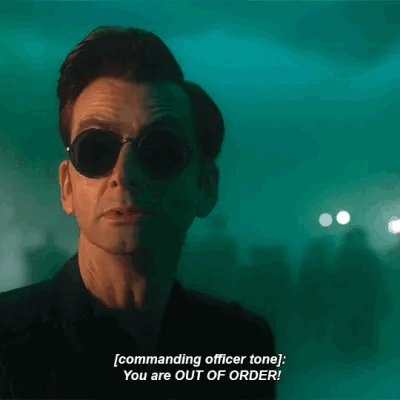
Onward, Patsy. (I hope you're still with me.)
1941, the Blitz part 2, minisode.
We've found Excalibur! On to Camelot!
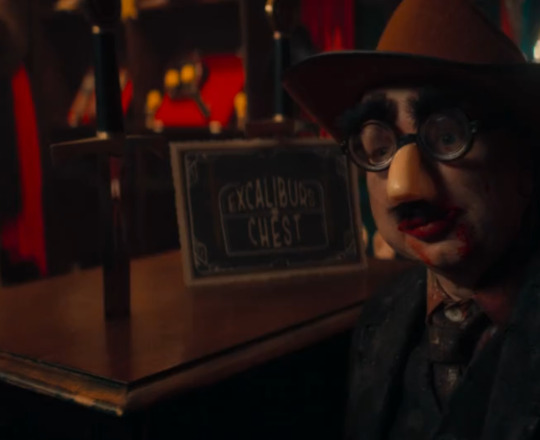
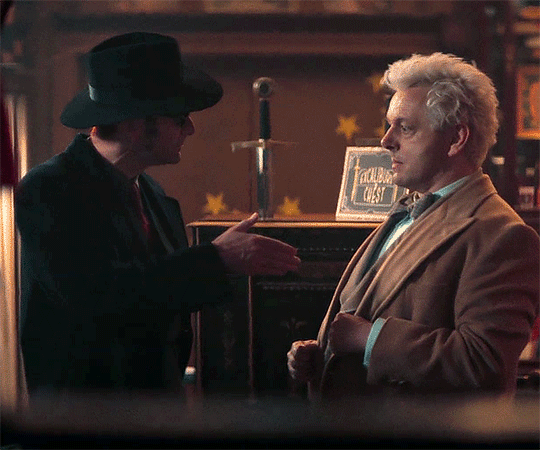

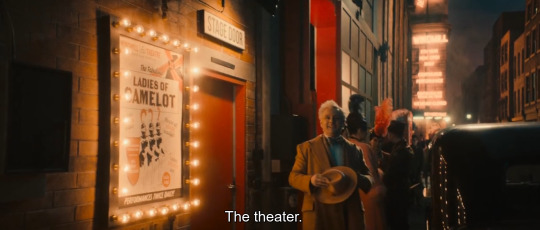

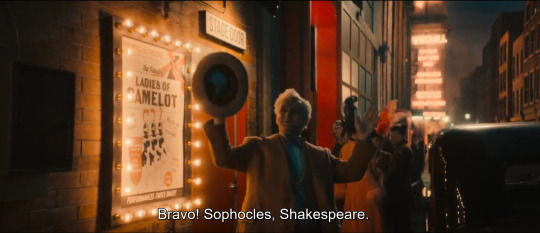
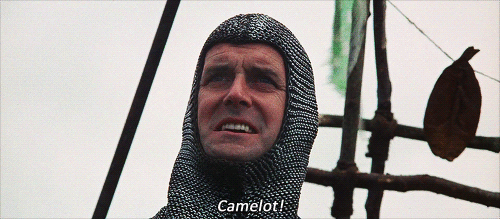


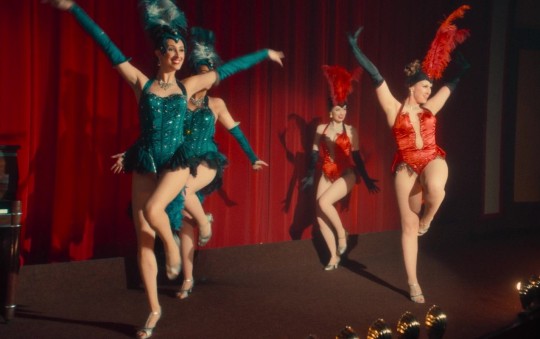

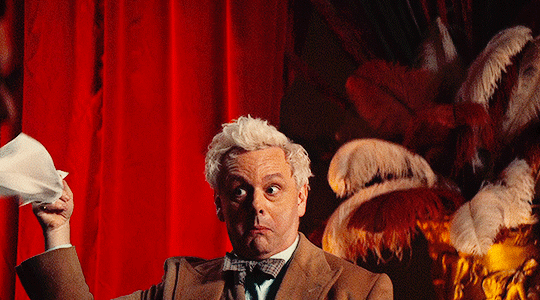
[Edit note: I've added a few GIFs and screen shots into the sequence of parallels above because I was thinking over a few things since I posted and felt this actually sat better. To try and explain, as they don't exactly match as I would like, in the Holy Grail movie, King Arthur and the knights he has gathered rock up at the foot of Camelot and gaze up in awe at it. "Camelot!" Arthur declares to the party. "Camelot!" Galahad echoes in excitement. And a third "Camelot!" comes from Lancelot. What do we get in GO? Aziraphale leaps out of the Bentley (Crowley's black horse) and declares "The theater! Sophocles! Shakespeare!" I swear, if you put the two side by side, they would match. It's not just a reminder of how much time Aziraphale has seen pass by, or that we are seeing a tragedy play out. But damn it, I could so just see Aziraphale attending a Sophocles performance in Athens back in the day...]
Camelot was King Arthur's castle and home of his court. In S2 of GO the Windmill Theater is established as our court of Camelot where our 1941 Blitz-era Arthurian drama is to play out, involving Furfur and the zombies.
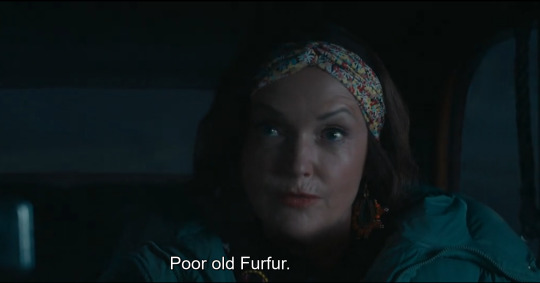
Yes, poor old Furfur. Two's company, three's a crowd, as they say. Now we know we're in Camelot, we need to be reminded of the central tragedy of the Arthurian story, that ultimately led to the golden kingdom's fall. Lady Guinevere, Arthur's queen, famously loved Sir Lancelot, and the two were passionate lovers. It was essentially a love-triangle at the top, with Arthur being jilted, but he wouldn't/couldn't discard his queen. Where do we see this playing out in 1941?
Furfur, pleased with himself for catching an angel and a demon in the act of consorting together (with the help of the zombies,) barges into the backstage dressing room, and confronts the lovers with their crime. But who is playing who in the Arthurian love triangle? I would say Furfur is clearly caught in the role of Arthur here. Consider the following exchange:
FURFUR: Hmm, well, well, well… What have we here?
AZIRAPHALE: Sorry, have we met?
FURFUR: Oh, no, you never had the pleasure, but… we have, haven't we?
CROWLEY: Have we?
FURFUR: What do you mean "have we?" You know we have. We were in the same legion. Just before the Fall. Doing dubious battle on the plains of Heaven. Remember?
CROWLEY: I remember going into battle, I don't remember being there with you. Sorry.
FURFUR: I was right next to you. We did loads together. You use to jump on me back, little monkey in the waistcoat. Anyway, whether you do or whether you don't, it doesn't matter. I'm here to inform you, as a representative of the Higher Powers of Hell, that you, Crowley, are in breach of the Infernal Code. Consulting and collaborating with an angel, Fell the Marvelous, aka… [opens book] Azirapalala. Azirapapap. Aziphapalala.
AZIRAPHALE: [annoyed] Aziraphale

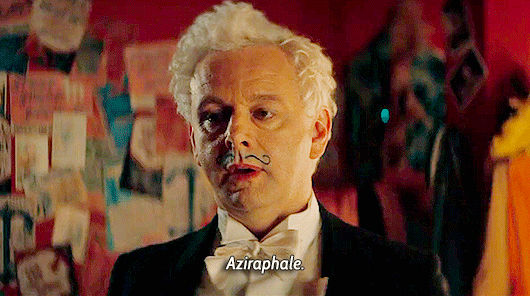
Furfur claims a past intimate relationship with Crowley, which Crowley spurns offhandedly. Crowley is playing Guinevere here, jilting Furfur/Arthur, which leaves the demon-smiting Aziraphale standing in for the handsome hero Lancelot (with his French connections, no less), and doesn't he make us weak at the knees when he drops his voice an octave in dominating disgust. (Is it suddenly getting hot in here...? Phew!)
Interestingly, looking back in S1 at 537AD Wessex, though, I would say that Crowley was Lancelot as the Black Knight, a role that Lancelot sometimes played in the legends, and Aziraphale would then be the fair maiden Guinevere. It certainly plays into Crowley's long term role of playing the knight who comes to the rescue of Aziraphale's princess in distress. Excalibur was no where in sight, perhaps still beneath the waters of the lake. Nor Arthur. Perhaps it was still too early in the story then...
I had originally suggested in my very first post that Furfur was given a stag as his demon avatar because he was wearing horns for being cuckolded by Crowley. But I wasn't quite thinking about it in context with the Arthurian legend! The stag is also often associated with royalty, plus while wandering around the medieval bestiary website that someone linked to, it interestingly notes that the enemy of the snake is the stag and the stork (Shax's avatar.) Ah ha!
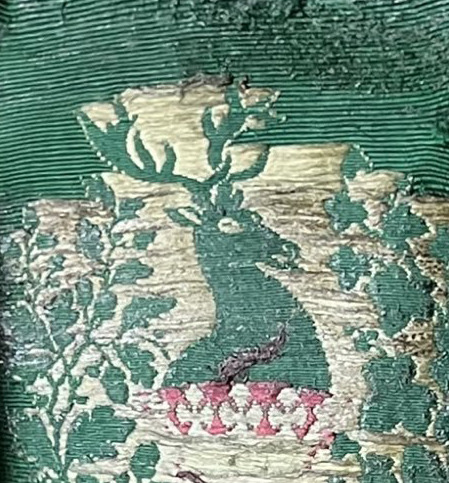
So how can we extrapolate this knowledge into a possible appearance of the Arthurian theme in S3?
Will we see the love triangle of Arthur/Guinevere/Lancelot come back into play and cause more chaos? I'm wondering if it might have something to do with the Fall.
Or will our lovers bring down a divinely-appointed ruler via their committed behind-the-back defiance of expected propriety?
Will Excalibur appear from beneath the waters, perhaps in another form, to declare a new king?
Could it even be a combination Jesus/Arthur, King of the World, returned? And they turn out to be a very naughty boy, disappearing into the night clubs of Times Square, New York, and that's how they lose him? (Social media viral sensation, anyone?)
I wouldn't be half-surprised if Greasy Johnson's name turns out to be Arthur, actually.
And no, I haven't forgotten that Adam's dad was named Arthur as well.
Bring on S3!
**Bonus**
If you've made it this far and you're thinking:
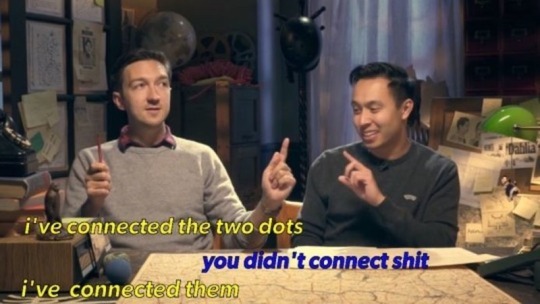
Let me leave you with this last connection.
In the back stage change room, remember Furfur delivers these lines:
FURFUR: What do you mean "have we?" You know we have. We were in the same legion. Just before the Fall. Doing dubious battle on the plains of Heaven. Remember?
On the first level, he is referring the Great War in the Good Omens AU.
On the second level, Furfur is paraphrasing Milton's Paradise Lost.
On a third level, I can (and will in a future meta) connect this back to the training initiative paintball fight at Tadfield Manor in S1.
And even deeper on a fourth level, if you do know the Holy Grail movie well, you'll remember there is an odd little subplot in it, that infers that the whole King Arthur and his knights thing is merely a full-on violent cosplay that is murderously rampaging across the countryside in the present day with the police in hot pursuit. It's a strange juxtaposition between reality and dream, and you aren't quite sure what it is real or not. The ending is bizarrely and abruptly surreal as the two story lines collide in the heat of battle, as the police turn up and arrest the combatants. A bit like this:
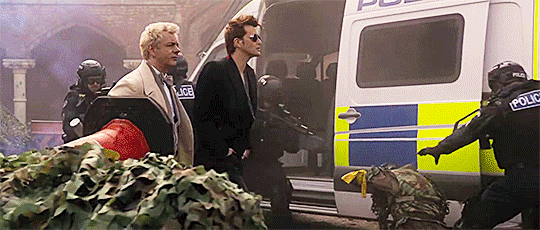
#good omens#good omens 2#good omens meta#good omens analysis#aziraphale#crowley#king arthur#king of the who?#the return of king arthur#excalibur#the lady of the lake#watery tarts#monty python#monty python and the holy grail#run away#camelot#arthurian legend#ladies of camelot#guinevere#lancelot#the once and future king#once and future royalty#good omens 1941#furfur#shax#dubious battle on the plains of heaven#tadfield manor
172 notes
·
View notes
Text
I wrote a giant Raven Cycle analysis
Hi! Over the last year or so I've been working on a sort of essay about various themes in the raven cycle series, and I finally finished it a few weeks ago.
It is titled: "Why I love The Raven Cycle - An excessive analysis of the themes of friendship, queerness and growing up".
And since tumblr loves its meta (and bc I love peer validation) I've decided to start uploading it bit by bit here, making this the masterpost (if I can figure out the logistics of the linking lmao, bear with me)
(beware of spoilers up to greywaren starting at like 3b!)
Introduction
What even is the Raven Cycle?
Trust me, the characters are queer as fuck and I can prove it
a) Blue Sargent
b) Gansey
c) Adam Parrish
d) Ronan Lynch
e) Noah
f) Henry Cheng
g) Honorary mentions
The Gangsey is a polycule
Analyzing the reoccurring themes
a) Friendship
b) Being a teen/growing up
c) (Found) Family
d) Magic (as a metaphor)
e) Further themes I appreciate
Drawing a conclusion
Click here to start with the introductory parts!
1. Introduction
So here’s the thing: I love fiction almost as much as I love my friends. There’s something deeply comforting about the escapism, even if the book actually makes me want to scream and throw it on the floor (only one book has been thrown so far, I promise!). Fiction is a healthy thing to occupy my thoughts with: headcanons! Quotes being on loop in my brain! Just fandoms!
And for me, if I am hooked on a book (series), it does not even need a good plot where a lot of things happen. In fact, I would say that my enjoyment of a book is made up of 30% plot and about 70% characters and vibes. If the characters are bland, if they do not make me feel much emotion, it likely won’t be more than 4 stars (additional info: I am way too nice rating books!). I really, really need to love the characters, to be able to relate to some aspects of them, or it just won’t become an obsession.
Since I have already started explaining that a bit, let’s look at this question: What is important to make a book special to me?
1. I need to cry reading it.
2. I have to think about it often, even weeks to months after having read it.
3. Obviously, I need to love the characters.
4. I need to be in the fandom! This can be hard with some books, but the internet is a whimsical space allowing you to find at least a small number of people who are obsessed with a work of fiction to a similar extent as you are.
Now, why am I elaborating on this so much?
It’s because The Raven Cycle did all that for me. It is my favorite comfort book series at the moment, for all those aspects mentioned, but of course I cannot just leave it at that.
No, I wrote a whole-ass analysis on headcanons and some of its themes. You’re welcome.
2. What even is The Raven Cycle?
The Raven Cycle is all I adore and live for (next to my friends).
So, naturally, it’s a book series, specifically a four book young adult contemporary fantasy series by American author Maggie Stiefvater.
The books in question are: The Raven Boys (2012), The Dream Thieves (2013), Blue Lily, Lily Blue (2014) and The Raven King (2016), and yes I will admit that the publishing dates are a bit of a red flag.
There is also the very relevant follow-up series called The Dreamer Trilogy (Call Down The Hawk, Mister Impossible, Greywaren), but it’s a lot less easy to get into that here as I do not know these entire books by heart, so I’ll stick to the original tetralogy here.
To stick to red flags, the books are set in the fictional Henrietta, a rural town in non-fictional Virginia, US, in the 2010s.
However, that doesn’t really say *that* much about the plot, so let me summarize that really quick, because I can do better than the official synopsis! (Or let’s pretend I can.)
Blue Sargent comes from a family of psychics, yet she does not have any powers of her own. Even worse, she is a bit of an amplifier for the others, meaning she is always somehow but never directly involved in the business. As if that isn’t enough for an identity crisis, every psychic she has ever met has told her that her kiss would kill her true love. Yikes.
But because she is that amplifier, she comes to a church watch on St. Mark’s Eve, where psychics see the spirits of those to die within the following year. It’s important business, but to her it’s really just staring into the dark.
Until she does actually see a spirit: That of Gansey. Of course this is not a coincidence. No, to add to this teen’s mount of problems, there are only two reasons why a non-seer would see someone’s spirit: They are their true love, or they killed them. Or, in Blue’s case, maybe both.
The aforementioned Gansey is Henrietta’s Golden Boy, the son of politicians (read: he’s fucking loaded). He does not run with the Republicans though, he runs with dead Welsh kings, meaning he has been searching for the probably dead, presumably sleeping Welsh king Glendower (*1350; †1416; yikes) for the past like seven years. Why the fuck would he do that? Well, legend says that he will grant a wish to whoever wakes him, and our favorite PTSD-ridden guy really wants that favor.
Aiding him are fellow Aglionby students Adam Parrish, Ronan Lynch and Noah Czerny, plus Henry Cheng, though only a lot later in the series, but I really did not want to leave out that menace (affectionately) here.
The paths of Blue and the boys cross because of Gansey’s search for Glendower, plus the fact that Blue works at a popular pizza place, but that’s a lot less whimsical.
And, well, there’s the implication that Gansey might also be her true love, but perhaps she just kills him because of his bad fashion sense, it would be justified.
Anyway, in true Famous Five fashion (Ronan is the dog; I won’t elaborate, the girls that get it, get it) they are of course not the only ones searching for the king, so it’s not completely a wholesome friend bonding activity all the way through.
Be prepared for: friendship and growing up, lots of treasure hunting, family mysteries, magical forests, illegal and slightly distasteful activities (our favorite of course), but most of all, heavily queer-coded (or even canonically queer) characters. Be Gay, Do Crime.
#y'all better like this it took a while#trc#the raven cycle#gansey#blue sargent#ronan lynch#adam parrish#noah czerny#henry cheng#the raven king#the raven boys#blue lily lily blue#the dream thieves#let's hope i don't forget about this after the first part#please talk to me about your thoughts
91 notes
·
View notes
Text
Hey gw2 peeps I recently learned that this interview exists (it’s from late December last year)
And I think reading through it gives a lot of context for why the latest update(s) may not have hit the mark for more story inclined people.
(My own thoughts/analysis under the cut. I’ll try to be vague spoilers but it comes with the territory)
Ok first to get it out of the way: my thoughts. I like this update! I think the new part of the map is beautiful as always, and it feels a LOT livelier than the first part. The new meta is less intensive than The Road to Heitor and feels fun to drop in and to replay, which is nice. I love all of the events that focus on helping civilians. I’m glad we have a portal from the Wizard’s Tower now, too! I haven’t really dug into all of the new weapon proficiencies on all classes, but I am enjoying engineer shortbow in WvW! I think this update has a lot more than a lot of people are giving it credit for, because what’s here is more mechanical gameplay than story instance content. I’m ok with the player character being A Hero and not THE Hero, but I do wish the commander had more speaking lines because it’s the little things that make the story so immersive and fun for me.
Speaking of, I want to highlight a quote from the interview I linked above. The rest of it is really fascinating, but this part stood out as specifically relevant to the discussion being had.
We’re learning a lot about how we develop and release content on this cadence, which absolutely has a downstream effect on the player experience. The overall shape of development between expansions 4 and 5 are very similar (timelines, resourcing, etc), even if the content and features are not. This means that we’re able to focus more on refining our development processes than reinventing them. The better that we can identify production issues like undocumented dependencies, bottlenecks, resourcing issues, etc, means that we can proactively address those issues in future dev cycles.
From our experiences with Secrets of the Obscure alone, we’ve adjusted development schedules, review processes, dev resource allocations, documentation and communication practices, and more. All of these contribute, to some degree, to improving the quality of what we deliver.
So basically what I’m getting here is that SotO was a huge adjustment, and if I’m reading between the lines correctly, I would guess that the adjustment was probably a little rough (to put it mildly).
I think this is why the story instance content was weaker than what other updates have provided. It makes sense that if a speaking part had to be cut/diminished, it would be the player character’s. 10 different voice actors for each line of dialogue is a lot more difficult to plan logistics for than a single voice actor reading ten lines.
But it also makes me hopeful that the devs at Anet will continue to learn from whatever might have gone wrong, and I am really excited to see what’s next!
73 notes
·
View notes
Text
this article about why Facebook continues to serve ads for drugs to Instagram users has some very very funny quotes from platform moderation managers
An expert who studies content moderation told us that our investigation suggests Meta is not as sophisticated at reviewing and approving ads as it is at moderating normal posts on its platforms.
“You need to think about how much of an issue, historically, general content moderation has been,” Karan Lala of the Integrity Institute, made up of former integrity team workers at companies like Facebook told me. “The maturity of the different integrity teams is relevant to the kind of problems platforms have had in the past.”
“With ads, a lot of the issue has been regulatory: Election ads spreading misinformation,” Lala said. “Ads for spam, ads for low quality content. Moderation of that seems a little less developed. In theory, these integrity teams should be feeding into the same systems. Ads should theoretically be going through a review process … a lot of these things are something that just should be getting caught [at the review process.]”
for context, every single Facebook ad is reviewed by a human before it goes live. seems sensible, right? well, the ad in question they approved:

lmao.
160 notes
·
View notes
Text
Love, Lies, and Romance: The 3 Ships of Oshi no Ko and 3 Thematic Resolutions
Oshi no Ko is a series deeply concerned with what it means to love and be loved. Ai's wish to love is what starts off the series; her love for her children, and their love for her in return, form the emotional fulcrum upon which the whole manga turns.
Romantic love, too, is a type of love. Aqua's three possible romantic relationships each represent three different interpretations of how to love, and how those relationships are treated is a reflection of how the series views those kinds of love.

For organization's sake, I'll go down the list in order of what I judge as least to most likely to occur in the manga itself.
Ruby - Love is Lies
I've already written a longer meta about this, but to summarize the relevant parts: Ruby, as depicted in chapters 77 to 142, doesn't understand Aqua, nor Gorou. She instead loves him for the image she's constructed of him in her head, for the way he makes her feel - but this has very little to do with the man himself. Her view on Aqua is, in my opinion, a direct parallel to Aqua's view of Ai - she puts him on a pedestal, idolizes him, but that same impetus is what has her mentally keeping a distance from his real self. You can see this all the way back in chapter 77. When she thinks of him, she first thinks of how he made her feel:
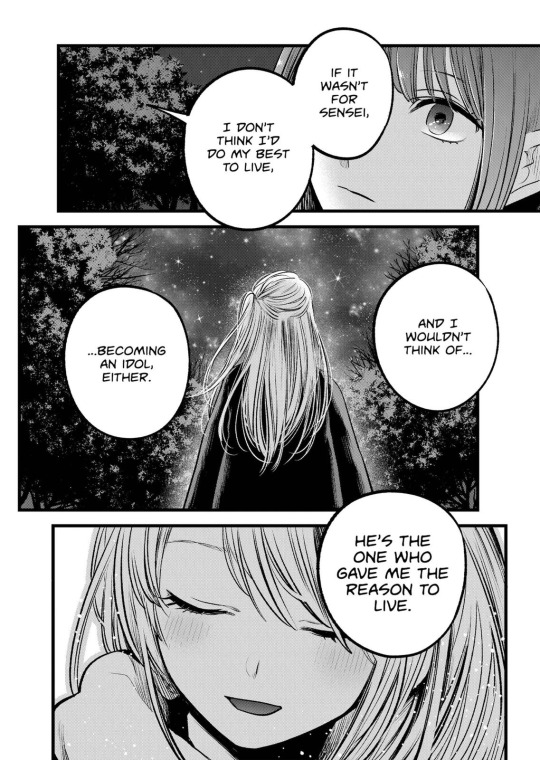
Now, this isn't on it's own a red flag, but it is contrasted directly afterward: when asked to predict his own actions and feelings, she's hilariously off:
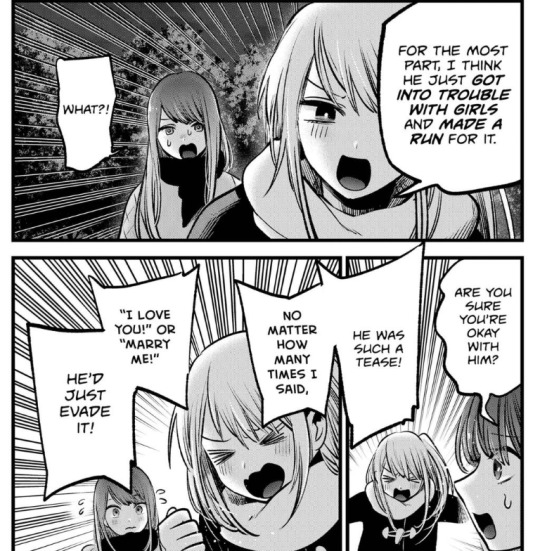
I think many readers kind of wrote this off as a joke at the time, but this kind of thing lines up perfectly with her behavior in the movie arc. Not only is she inventing a backstory for him (does Gorou ever show romantic interest at all? Why would she assume he was in trouble with girls?) but more importantly she interprets his kind rejection as a tease, and his care to a friend and patient as romantic intent.
A version of the story in which Ruby is Aqua's love interest would literally validate Ai's famous quote, that lies are love - that the person doesn't matter, only how they make them feel does. And that is directly contrasted by, uh. The whole rest of the manga. But to pick a specific scene, see C9:
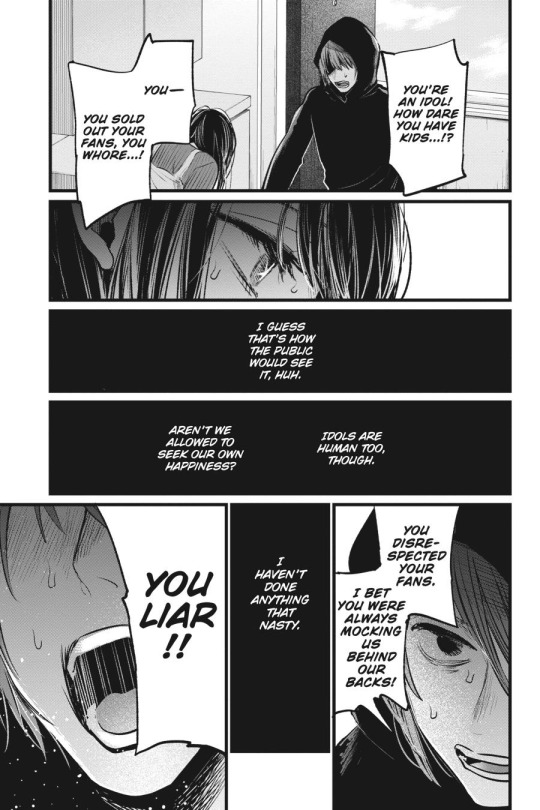
The kind of love where one person projects on another, the manga has shown us again and again, the kind of love that is lies, results in this. It cannot end happily, for anybody. If Ruby and Aqua end up dating for real, my next bet is that the story ends in tragedy, because that's the only end for that kind of love in Oshi no Ko.
Akane - Love is Lying
To Akane, love is an act - a lie. But hear me out, this is markedly different from Ruby's position. Akane, I think, is actually the closest of the main characters to Ai's mindset. She doesn't feel that she understands love, but she wants it, so she actively cultivates an image of herself that can show love. We know this well, of course, given her actions at the end of LoveNow. She creates a persona of love in chapter 28, much like Ai describes in 4.
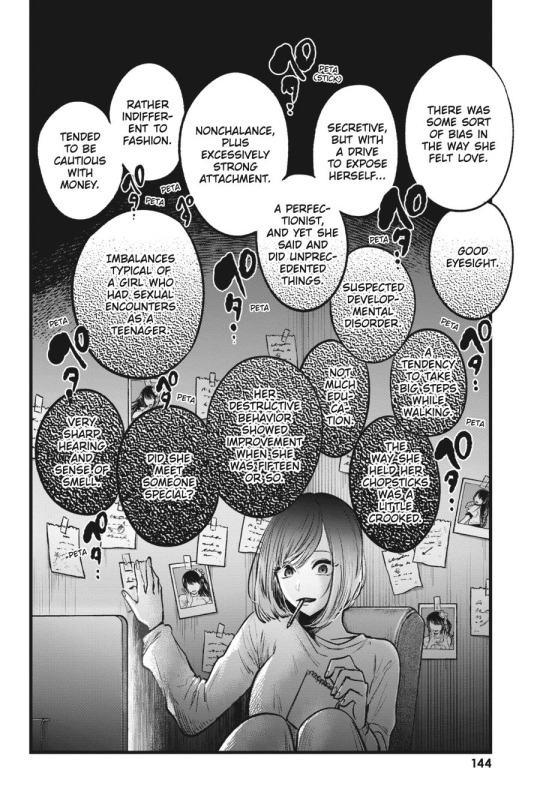

And believes that regardless of the artificiality of it, she can keep up the act forever: to earn love through the act is to earn it in reality.
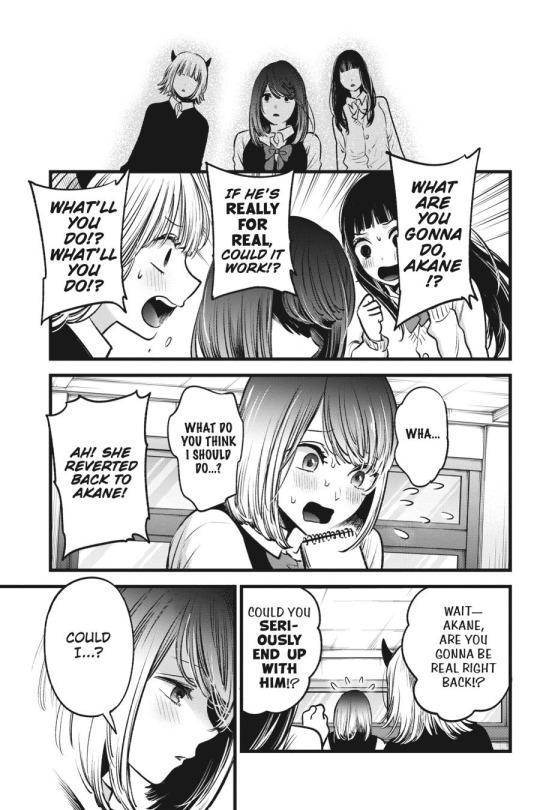

So you may be asking: what is the difference between what Akane is doing, and what Ruby is doing? Well, the difference is in the intention. It is not the lies that are the important part, but the lying - neither Akane nor Ai felt they knew how to love, but their desire to love, their care for others, that was all real love. The performance they put on for others was not an impersonal pedestal, but an active effort done for another's sake. It may be lying, but it is an act of love nonetheless.
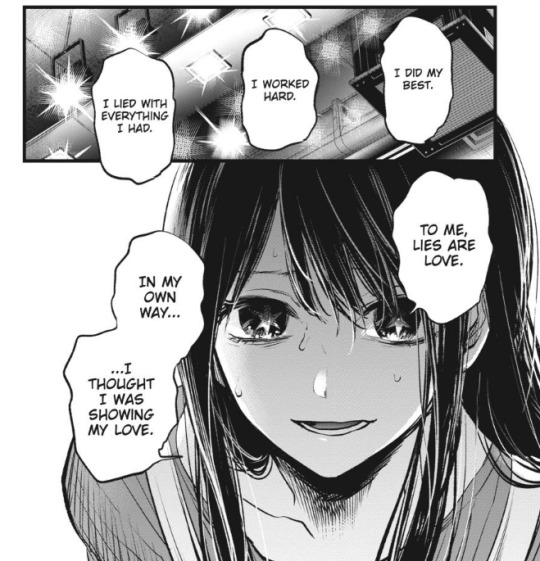
If Aqua/Akane was the endgame ship of Oshi no Ko, it would be a simultaneous validation and rejection of Ai's worldview. Yes, if you care enough, lying can be love, if you are willing to forge that connection. But, in this paradigm, Ai's mistake was lying one-sidedly, to a faceless crowd. The crowd cannot return your love, not in a way other than idolization, and we discussed how that turns out in Ruby's entry. Akane's relationship, on the other hand, is much less one-sided and unhealthy, because she lies for Aqua's sake alone, and doesn't hide that she's doing it. As such, her performance can be recognized and appreciated as such, and he can reach back and return her love.
As such, while the lying is a performance, their relationship isn't a lie. The two of them start to see each other's real selves. The dynamic of two people who don't really understand love or how to love, performing a relationship together until they can learn how to do it together, is a sweet one. I could actually totally see this as the main relationship of Oshi no Ko.
But the actions of the characters make clear what the issue is in this kind of love. The seeds of this breakdown are set in chapter 72, which is ironically one of the ones that sets the dynamic up - even as they are trying to create an equal relationship, Akane decides to lie to him for his own good. After all, their relationship has already been established on the basis of lies. To lie for someone else's sake is inherently a one sided choice, and while in chapter 28 we can see it as a cute start to a relationship, it comes back around in a much more harmful way here:
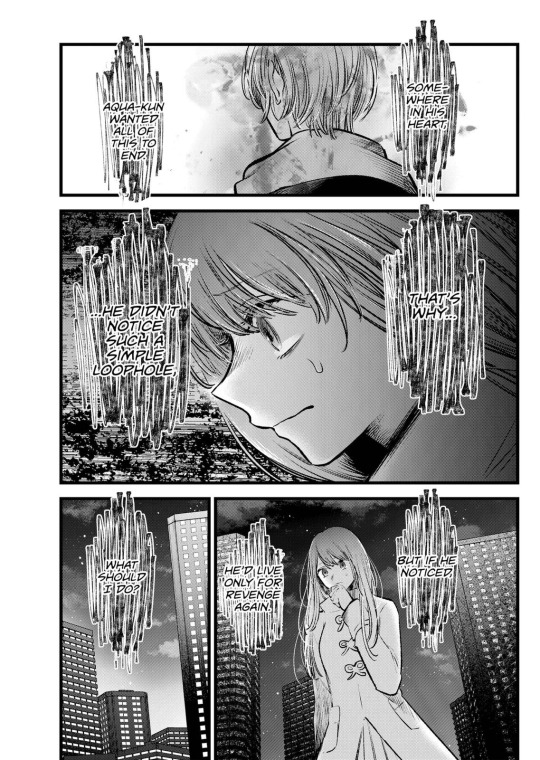
which pays off in their grand breakup in chapter 98. Akane is willing to one-sidedly make the choice to kill Hikaru for Aqua's sake. Aqua, in return, refuses to let her make that choice, tracking her position, then stopping her and cutting her off for her own safety. While Akane is the one who calls him out for this, neither of them are treating the other as someone with agency, and both are making choices for the other. As such, in Oshi no Ko, lying cannot be love - you cannot impose your love on another.
Kana - Love is Sincerity
Kana, differently than Ruby and Akane, is defined in her moments of honesty and sincerity. She is an actress, yes, but even her acting is a kind that emphasizes her true self. There's too many pages to post here, but chapters 60-63 talk all about this directly - her modern acting is about hiding herself in order to aid others, but her best acting is when she ignores everybody else and acts to her heart's desire.
This same sincerity is what forms the basis of the Aqua/Kana ship. Unlike the two above ships, which are on some level founded on artifice, many of the moments between Kana and Aqua are focused on moments where they are each acting as their truest selves. Chapters where they interact, like 30 and 117, show that they both have an easy rapport, acting thoughtlessly and honestly. Chapter 40 points this out directly: Kana has the ability to draw Aqua out of his depressed and overthinking mindset, letting him be his unrestrained self.

This is similar to Ai's own actions in chapter 4. Though she normally puts on a facade and acts out love for the cameras and crowds, the one moment that she is truly recognized as smiling is the moment she accidentally lets slip, and shows true love for her children:
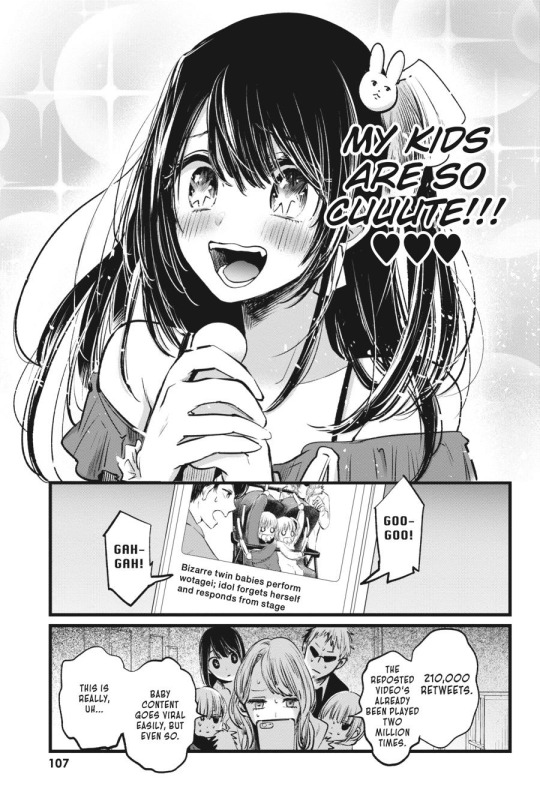
As such, Aqua/Kana serves as a complete repudiation of Ai's mindset. She was wrong that one can lie to love. The only way to love is to be honest, the only time she was able to honestly express love was the moment she died, when she was able to tell her children she loved them. If you aren't sure how to love, you must reach out honestly and you will find it. No act or performance can be love, no matter how well meant.
If this is the ship the manga ends on, which it could be, the message would be that love is in baring oneself to others. Hiding from others with lies, even when well intentioned, like Aqua does to Kana before chapter 107, is a mistake, and to love truly you need to face up to your own feelings and see the other person directly.
Finale
So, what does this all mean? It means that the romantic love demonstrated in the three ships are unavoidably intertwined with the story's ideas about love as a whole. However, his isn't necessarily a foolproof prediction of what the author plans to do next, or what ship the story endorses. Though obviously I think some of these are much more supported by the series than others, until we reach the end it is still possible that things will change, and it could go with any of these, or none of them. This is merely the lens in which I interpret the romantic interactions in the text.
In fact, it's entirely possible that the series ends with no romantic resolution at all, rejecting all three above views on love. After all, while the romantic relationships are undeniably important to the narrative, the love that started this whole story was Ai's familial love for her children - thus, I wouldn't be surprised if platonic love between family and friends will be the most important in resolving it. In any case, the question of how to love is a key part of the series, and will have to be resolved by the story's end.
#oshi no ko#ruby hoshino#akane kurokawa#kana arima#ai hoshino#aqua hoshino#step.effortpost#step.animanga#step.blogger
63 notes
·
View notes